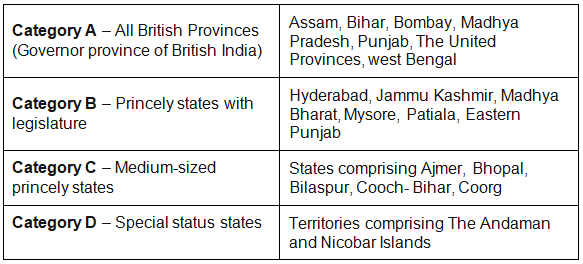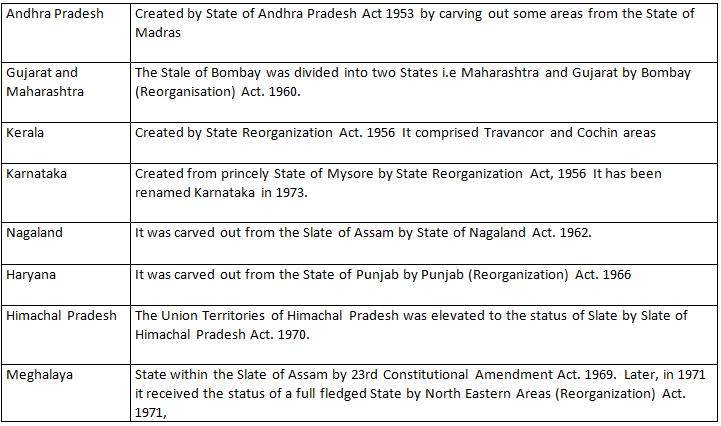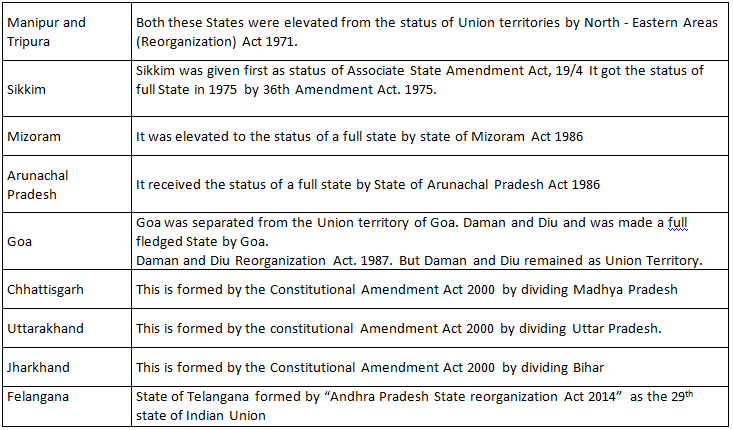State Reorganisation | Geography Optional for UPSC PDF Download
Introduction
- Hetter said that the races with language, customs, and religion provide Cultural Landscape as ‘Landschaft kunde’. This after independence was used by Indian planners for purpose of state reorganization.
- Fazl Ali commission advocated state reorganization action on the basis of cultural landscape especially the language. Andhra Pradesh was the first state to form on a linguistic basis.
- The reorganization was needed after independence due to 2 factors –
(i) To develop a new administrative setup for this vast country which included both British provinces and princely states.
(ii) New India had been born with a legacy of regional governance so it wasn’t easier to abandon the regional government. - Due to these factors, reorganisation of states and provinces was needed, but it wasn’t an easy task due to extreme physical, social, economic, cultural, political, and administrative diversities in India.
- Immediately after independence, India adopted interim federalism (on temporary basis) where four types of states were demarcated:

- But there was a need to reorganize the administrative units for smooth functioning of Indian Federalism, Indian constitution was directed towards Federalism (the word ‘states’ was borrowed from the American federal system).
- New states were demarcated in 1956 on the basis of states Reorganisation Act, 1956 which was based on the recommendation of states reorganisation committee which was constituted in 1953 and submitted its report in 1955.
- On the basis of this recommendation, a new political map of India was created having, 14 states and 6 Union Territories.
- This state reorganisation exercise was based on the principal of linguistic states. The commission had used the 1951 census as the reference line for linguistic distribution in India. It was found that there are 744 languages and dialects in the country but 97% of population is well acquainted to 14 languages only. So there may be bi-linguistic, multi-linguistic societies in India, but the 14 languages have areal continuity in distribution (e.g. Tamil, Telugu, Malayalam etc.)
- Areal continuity of a particular variable was essential for demarcating the states of India. For example all Tamil speaking people should fall into one State with areal continuity. This was found as the most favourable political social factor for the reorganisation of states.
- Although linguistic state was earlier opposed by the Dhar commission 1948 and then J.V.P. committee, 1949. Dhar commission had concluded that the unity of newly independent India would be jeopardizing if the political map of India were drawn along linguistic line.
- JVP committee observed that administrative, financial, and economic problems might be overshadowed by the linguistic issue.
Also political geographer Moody had viewed that linguistic unity leads to linguistic regionalism and ultimately to the formation of a state. They all opposed the linguistic states.
But there were public demands in favour of linguistic states particularly in South India. They argued that in absence of linguistic states, there may be imposition of Hindi Agitations in many parts.
There was violence in Telugu areas for linguistic state. At Vijayawada conference, CPI resolved in favour of linguistic states. With the violent agitation in Andhra, the centre had no alternative but to announce formation of Andhra Pradesh in 1951 by bringing together 11 Telugu speaking districts.
Fazl Ali Commission and Formation of New States
- After the formation of Andhra Pradesh on the basis of linguistic factors, all hell breaks loose. The other regions also started demanding for creation of separate states on the basis of linguistic factors. The intense pressure forced the Indian Government to form a new commission to visit the whole question of whether the linguistic basis of separation of states can be considered or not. It led to the formation of Fazl Ali Commission in December 1953
- Though Fazl Ali Commission rejected the idea of one language one state (since there was too many languages in India) but strongly recommended formation of linguistic states with the following arguments:
(i) It will not be a new experiment in this part of the world. If British provinces based on linguistic principles can function smoothly, there can’t be any problem for federal India.
(ii) There are only 14 languages which are dominant and are also viable for making states as they have geographical continuity over a vast area. Hence if linguistic states are formed, linguistic tensions shall be minimized.
(iii) There would be greater administrative efficiency.
(iv) Observation and assessment – committee members travelled all over the country (98, 420 km), interviewed over 9000 persons of different strata and region of India. Then concluded that the general feeling of people is in favour of linguistic states and such emotions couldn’t be ignored. - On the basis of these factors, the committee recommended linguistic states which were accepted with some modifications.
- Once the new political map of India was carved out, there were linguistic resentments in many parts of country and in some cases it became violent.
Due to continued pressure, in 1959 Bombay state was divided into Maharashtra and Gujarat. - Thereafter there was resentment in NE India Nagaland, people opposed to live with Assamese and so they started to make demand for a separate state. Even divisive forces began to emerge in NE India. So in 1963, state of Nagaland was formed (now totalling to 16 states). Before this, in 1961, Goa, Daman and Diu were liberated from Portugal and placed on UTs.
- In 1966, Punjab was divided in to 4 administrative regions and the principal basis was language. Punjab and Haryana were formed in 1966. The basis was dialect.
- For the first time in India Chandigarh was claimed by both states, so it was made a Union Territory. Purely Hindi speaking Kangra district was given to Himanchal Pradesh which was a Union Territory and was declared a state in 1968. Up to the formation of Himanchal Pradesh, Fazl committee was criticized. [After 1967 elections, when regional parties came to power, there was a wave to change the name of states.]
- After 1970, new variable for state reorganisation became important. During 1970s, culture, ethnicity and backwardness became the basis of peoples demand. Small states like Punjab and Haryana made faster growth. Though Punjab was demarcated on linguistic basis, but its economic growth attracted people. Particularly in NE India, there was a rising demand of statehood.
- In 1973, NE India state Reorganisation Act was passed under which NE India was divided into 5 states and 2 Union Territories. Already there were 2 states – Assam and Nagaland and 3 new states of Meghalaya, Manipur and Tripura were formed. Meghalaya was taken out of Assam (as Garo, Khasi and Jaintiya culture was different to Assamese culture).
- Manipur and Tripura were Union Territories and they were upgraded to state (total – 21). Two new Union Territories s of Arunachal Pradesh and Mizoram were formed.
- In 1975, one more state was added. There was a merger of Sikkim which became the smallest state. Owing to its geostrategic importance, it was made a state.
- In 1987 two Union Territories of Arunachal Pradesh and Mizoram were given statehood due to
(i) local demands
(ii) Geostrategic importance of these states. - In 1988, Goa was made a state on the basis of culture. Daman and Diu remained together as a Union Territory.
- In 2000, 3 new states were added – Chhattisgarh, Uttaranchal and Jharkhand. The basis of formation was the backwardness of these regions. Secondly in these areas the local tribes were becoming minority due to continued influx of outsiders. Tribes were afraid of their elimination.
- In India, linguistic state demands are over and this proves the foresightedness of Fazl commission which has contributed to the unity of India.
- Formation of Union Territories of Jammu and Kashmir and Ladakh (2019)
(i) On the recommendation of Parliament, the President effectively dismantled Article 370 of the Indian Constitution and gave assent to the Jammu and Kashmir Reorganization Act, 2019.
(ii) The former state of Jammu & Kashmir has been reorganized as the new Union Territory of Jammu and Kashmir and the new Union Territory of Ladakh on 31st October 2019. - The new Union Territory of Ladakh consists of two districts of Kargil and Leh. The rest of the former State of Jammu and Kashmir is in the new Union Territory of Jammu and Kashmir.
New States added since 1950


2014
- Telangana[ 29 states, 6 Uts];
- Telangana was part of Hyderabad’s princely state and the demand for a separate state was from 1947. But it has been merged to Andra Pradesh due to the Telugu language.
2019
- Jammu and Kashmir and Ladakh [Uts;
- Total 28 States and 8 UTS as of now.
|
303 videos|636 docs|252 tests
|
FAQs on State Reorganisation - Geography Optional for UPSC
| 1. What is the significance of state reorganisation in India? |  |
| 2. How does state reorganisation impact administrative efficiency? |  |
| 3. What factors are considered in the process of state reorganisation? |  |
| 4. How does state reorganisation impact the political landscape of India? |  |
| 5. What are some examples of state reorganisation in India? |  |
















